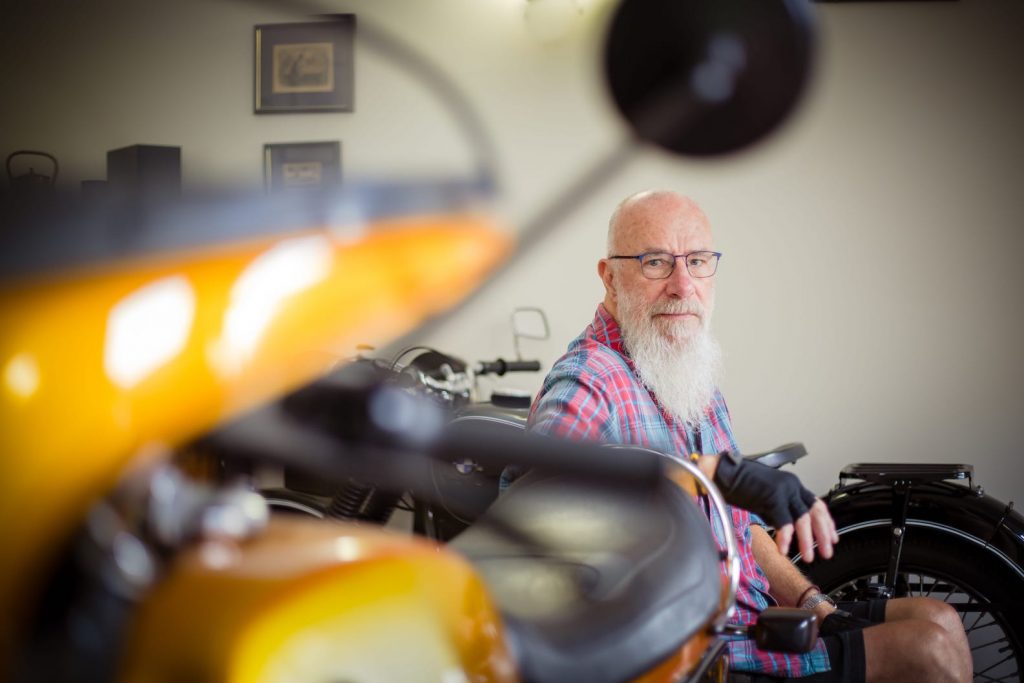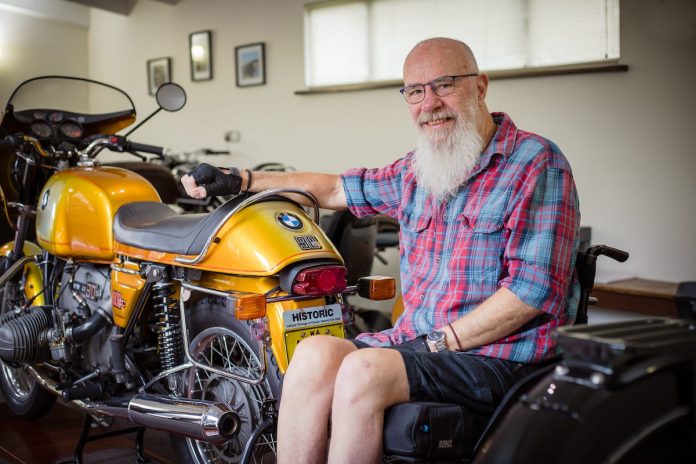Bob Rees knows only too well that life can change in an instant. And that instant hit him hard when he was on a motorbike trip through Africa with his wife Chris. A reckless driver slammed head on into Chris and Bob’s bike and the result was catastrophic. Chris lost her life, Bob lost his wife and he also lost the use of his legs.
That was just over two years ago and Bob has been working hard to regain his physical and emotional strength while adjusting to life as a widower and paraplegic. While it goes without saying that this is an immensely difficult journey, the events of that fateful day have been made even more challenging by what Bob was told when he was back in Australia and recovering in hospital.
“I was 71 at the time and when the staff at Fiona Stanley Hospital told me I was too old for assistance through the NDIS I was totally shocked,” Bob says. “I’d already been contemplating all the things I’d need when I got out of hospital and the modifications I’d have to make to my home and knew a big financial investment would need to be made.”
The fact that people over age 65 are not eligible for NDIS assistance not only angered and frustrated Bob but it has also led him to speak out against the inequality of the system.
And he’s not the only one. Dozens of organisations are calling for an end to the exclusion of older Australians from nationally funded disability support.
Campaign coordinator for Assistive Technology For All, Lauren Henley says: “your need for support does not disappear the day you turn 65. Depriving older Australians of support is simply ageism.”
Bob agrees and adds that while you can access your superannuation at age 65, not everybody will have enough money to cover the huge costs of what you may need if you become disabled.
“I was lucky as I did have a superannuation nest egg but if you don’t, you’re stuffed. Just to get my car seat and hand controls modified cost me $30,000. And you certainly can’t rely on the disability pension as it’s basically the same as an age pension.”

But it is not just the lack of access to the NDIS that has Bob a little pissed off, to say the least, it’s also the obstacles that people with disabilities have to deal with when moving around in public places.
“Even the car bays for disabled people in wheelchairs aren’t wide enough,” Bob says. “You need to be able to swing the car door completely open and have room to manoeuvre your chair in and out of the car. Then there are the lips on access ramps. I can pull a wheelie in my manual chair to get up and over it but in the electric wheelchair I can’t.”
Bob also cites disabled toilets as not being sufficiently designed for proper access and says he has been to two local venues in his hometown of Albany that didn’t even have disabled loos.
Accessing beaches is another area where Bob wants to see major improvement.
“Most of the beach wheelchairs aren’t that great and there’s certainly a lack of change room facilities. Like most people in a wheelchair I need a table, bed or bench to transfer on to when I get changed and I have yet to find a public shower or bathroom that properly caters for wheelchair users. In some cases I can’t even access the paper towel to dry my hands by the sink as it has been positioned so that only a standing person can reach it.”
In an effort to make his concerns heard Bob has spoken to his local Shire in Albany and even to the head policy maker for the Ministry of Disability. He’s also joined a working group to help make his local shire more accessible to those with disabilities.
“When I raise these issues with the relevant authorities, I’m constantly met with the same series of stupid responses with people telling me it’s either to do with regulations or it’s not their area or not their issue. But these people don’t have to live with these issues. People like me do.”
Bob is now calling for disability access standards that are consistent throughout Australia and for people who actually use the resulting modifications ‘in the real world’ to be involved early in the planning-stages. He suggests a cross section of people with varying difficulties and varying ages.
It’s important to note that while Bob may be frustrated by the inequality in disability systems and services he certainly does not let it consume him. He spends hours every day working to regain mobility in his legs and building strength, flexibility and stamina. And when he’s not working on his physical rehabilitation, Bob focuses on repairing his broken heart.
“My disability does not define me. Chris and I had a fabulous 47 years together and now I have to find joy in this different life I have. I’m still passionate about motorbikes; restoring them and modifying them so I can ride again.”
Bob has also found solace and meaning through singing, playing guitar and writing songs. He even aims to release an album in the next few months.



































